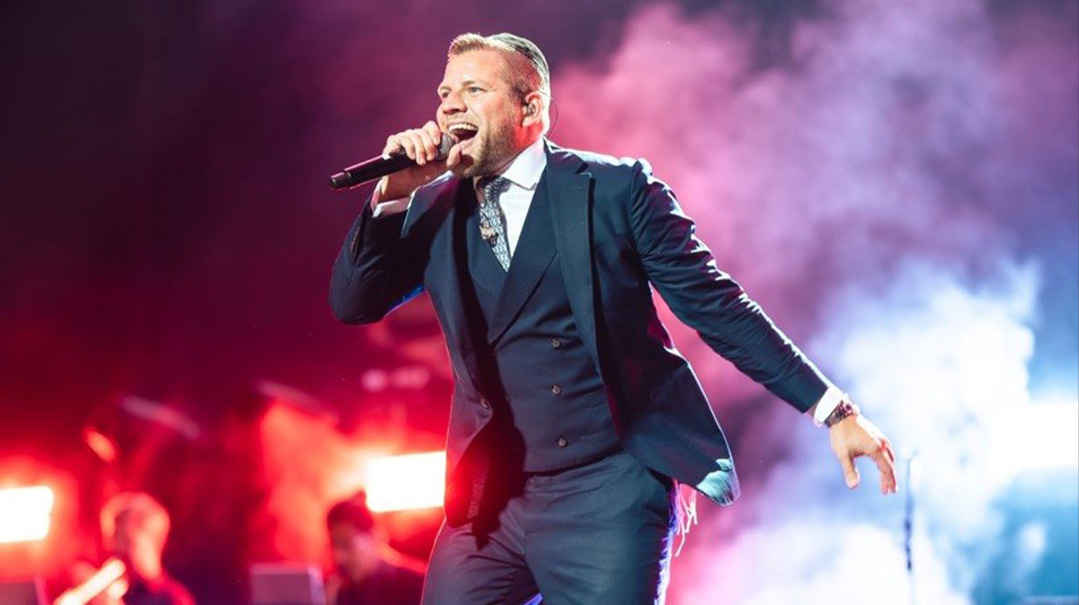Stuck in the Spotlight

You’d be surprised by how many of your favorite performers get the jitters before a show

You’re standing up there in front of everyone, ready to belt out your solo, your speech, or your lines in the play, when suddenly — your mind is a blank! Stage fright is a real thing. You’d be surprised by how many of your favorite performers get the jitters before a show. Yes, even people who have been performing for years still get nervous
So, how do they get through it? I spoke to some performers and other people with experience in the art of public appearances to find out the tricks of their trade
Ruchama Flax, 16
Actress
When I was 13, I decided to audition for the Chayelle Regal show, a professional theater production for women and girls that’s based in Ramat Beit Shemesh. I was actually really nervous about auditioning, but the first time I auditioned was during Covid. Instead of the usual in-person auditions in front of the directors, everyone had to just send in a video of themself — that obviously made it much easier for me! I got into the choir, and loved every minute.
The following year, life in Israel went back to normal — and so did auditions. I was too nervous to audition in front of everyone, so I didn’t join the show that year. A year later, I decided to just go for it, this time auditioning for the play. That year the show was The Lost Prince. On audition day, I reminded myself that I was doing this just for fun, and that helped get me through it. Auditions took place in the local community center. There were at least ten judges sitting at the table, including Chayelle Regal and Rikki Reichman, the show directors. It was beyond intimidating! We started off as a group of about 60 girls, singing, dancing, and acting together. Occasionally, one of the judges would ask a girl to step out of the room and perform by herself for a little bit. There were a few rounds of auditions, with girls being sent home after each round. Eventually, there were only about 15 of us left. When I was asked to come for callbacks, I knew that it had just gotten real. Getting a callback (a second audition) means there's a 90 percent chance that you’re going to be in the actual play. The callbacks are just a way for them to figure out which girl will play each part. At callbacks, I gave it everything I had — and I ended up getting the co-lead part in the play, The Rat. (I wasn’t an actual rat; my part was a street urchin whose nickname was “The Rat”.)
In total, there were 11 performances — eight in Yerushalayim’s largest theater, and another three in England. On the day of the very first show, I was freaking out! I must have looked completely crazy because people were plying me with energy drinks and doughnuts. Thankfully, as soon as I got onstage, I clicked into my character and got a wave of energy, and I was fine. The audience was very responsive, which really helped. Standing on the stage, you’re practically blinded by those bright spotlights shining on you, which means that you can’t really make out the audience. But the audience gasped and laughed in all the right places, and that was very encouraging. Baruch Hashem, all the performances went well and there were no major disasters. But as soon as I got backstage at the end of that first show, I collapsed from exhaustion and relief. Still, the first show was my favorite of all because it was the most exciting.
Looking back, I realize that I was sure I would be terrified to be onstage. But I practiced my lines and knew them all well, and in the end everything flowed smoothly. If you can sing or dance or act in front of your mirror, there’s no reason why you shouldn’t be able to do it on stage, too.
Rabbi Nachman Seltzer
Choir Director and Author
I directed the Shira Chadasha Boys Choir from 2002 to 2017, but I never really had boys who suffered from stage fright. Occasionally, the new boys in the choir would get anxious before their first concert, but I found that the older boys were great at reassuring them.
I personally had a few brushes with stage fright when I was younger. When I was in sixth grade, Senator Arlen Specter and his wife (he was senator of Pennsylvania at the time) came to visit my school and I was asked to speak. I got on stage and said, “Senator and Mrs. Specter, welcome to our community and to our school,” and then promptly forgot the rest of my speech. You can imagine how embarrassed I was up there! My friend was standing near me, holding a large bouquet of roses that he was supposed to later give to the senator’s wife. Mrs. Specter realized immediately that I was struggling with my speech. She saved the day by grabbing the bouquet from my friend and announcing loudly, “What beautiful roses!” Everyone laughed, and that was the end of that!
I might have been mortified, but I didn’t let that incident get to me. A while later, while at Camp Agudah, the head learning rebbi asked me to speak in front of the whole dining room. I must have practiced my speech 30 times! But when I got onstage, my mind went completely blank. Luckily, because I had practiced so much, I quickly remembered the beginning of my speech and was able to take it from there.
This taught me that the key to performing in front of a crowd, whether it’s at a concert, delivering a speech, or davening before the amud, is preparation. Being prepared takes away 98 percent of the anxiety.
Yitzy Bald
Composer and Choir Director of New York Boys Choir (NYBC)
Generally speaking, I’m at the point where I don’t experience stage fright anymore. But it wasn’t always that way. I clearly remember performing in Israel at a major concert with all the big singers. This time I was accompanying Mendy Wald, the famous singer, with myself playing guitar. He sang the famous “Ain Anachnu Maspikim” song that I produced, composed, and arranged. That song is an oldie that has recently become popular again. It is now sung by Rabbi Efraim Wachsman, who redid it with his own English lyrics, “If I Lived a Thousand Years.” The crowd was in the hundreds of thousands. I literally could not see to the end of the crowd. The audience went on and on for blocks. I was so scared. I walked on to the stage and felt like I was going to pass out from fright. On the spot, Hashem planted an idea in my head that really worked. I closed my eyes for a second and imagined that instead of standing in front of a live audience and looking at thousands of people, I was standing and looking at a postcard that had a picture of thousands of people. “I’m not scared of a postcard with a picture on it,” I told myself. It worked! I opened up my eyes and played as if I was looking at a postcard. The fear was gone.
It’s totally understandable that one feels stage fright at the beginning of one’s musical journey and career. To get rid of the fear, imagine things that put you into a calm state of being, and you will do fine onstage. The fear will leave quickly.
Another suggestion is to rehearse your routine very well, before the show. Of course, the first few times you perform you might feel some stage fright. However, when you feel prepared, you’re less likely to feel that fear as much. Just keep on rehearsing until you feel you have your performance down pat. You’ll see — b’ezras Hashem, you will do an amazing job!
Berish Hoffman
Bar Mitzvah Teacher
I’ve been preparing boys in London for their bar mitzvah for 15 years. I find that most boys are nervous leading up to their bar mitzvah. For most of them, it’s the first time they are performing publicly, sometimes in front of hundreds of people.
About a week before their bar mitzvah, I take the boys to the shul where they’ll be leining and do a practice run, going through the whole parshah in a sefer Torah. This is a very different experience from the lessons in the months leading up to the bar mitzvah when they’re sitting in my dining room with a tikkun koirim. Practicing in shul helps the boys get a feel of what it will be like on the actual Shabbos. I describe what they can expect on that day, and tell them exactly what position to stand in and how to hold the sefer Torah.
Often, when boys get nervous during leining, they want to get it over and done with as soon as possible, so they speed through it without pausing for breath. Being out of breath makes them tired, which makes it more likely for them to make mistakes. I teach my students to take a small breathing break between pesukim and between some phrases to help them relax and remain focused.
Stage fright symptoms
As I said in the introduction, stage fright is a real thing. It even has its own symptoms that are recognized in the medical world. If you’re about to get onstage and suddenly feel like you’re dying/having a heart attack/having a stroke, take a deep breath and remember, stage fright can’t actually kill you.
Sweating
Chills
Headache
Stomachache
Nausea
Fear of failure or ridicule
Stuttering
Long bouts of silence
Urge to escape
How to fight stage fright
The tips from the interviewees in this article are great. Here are some more tips from the pros on how to deal with stage fright:
Don’t obsess about being perfect
Keep your mind on the present, not on the past or the future
Don’t focus on the audience; try to focus on the end of the stage
Don’t focus on mistakes; move on with the show
I’ve noticed a common theme among all these tips, and that is that “practice makes perfect.” So next time you head to the stage, make sure to know your part inside out, and the rest will fall into place.
(Originally featured in Mishpacha Jr., Issue 971)
Oops! We could not locate your form.






